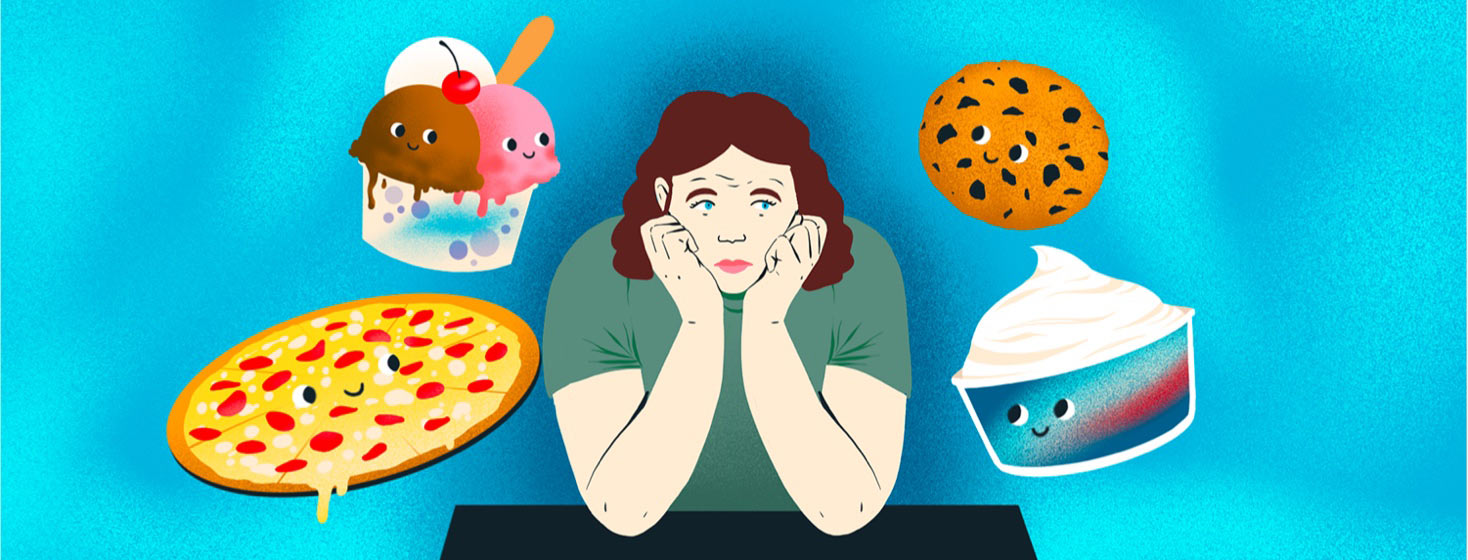Coping with Binge Eating
Some late nights you might be able to catch me searching through the pantry, my stomach growling angrily, looking for some tasty tid-bits of goodness to wolf down. These nights are shrouded in shame. Yet since I live alone, the only witness to my indulgence is my dog, who eyes me with longing (and perhaps a bit of jealousy). However, she doesn’t look at me in disgust. So why should I?
Narcolepsy and binge eating
Binge eating has been an issue for me for as long as I can remember. But it wasn’t until my narcolepsy onset in my early twenties that it became an egregious issue. I gained 80 pounds when my narcolepsy onset, due to the amount of binge-eating I was doing, especially at night.
My hunger was insatiable. No amount of sleep could make me feel rested and no amount of food could make me feel satisfied. I know now that there were many reasons for this, all biological. As soon as I got on the best treatment plan for narcolepsy, my weight dropped again. But that didn’t change the psychological aspects of binge eating that I’ve struggled with since childhood.
Eating as a distraction
I used mindless eating to numb myself from the painful anxiety I experienced, to comfort myself during adverse childhood events, and I used binge eating to make myself feel anything, anything at all. The sensations are comforting - the flavors of the food, the smell, the texture. All of these provided a sensory experience to distract me from what was really going on in my life. With a sensory experience and a distraction that effective, why would you want it to end? So I’d keep eating, not wanting the good feelings to stop.
Raised with a toxic-dieting mindset
It didn’t help that I was raised with a toxic-dieting mindset. Exercise was punishing rather than fun. I tried my first diet as young as 8 years old. The "diet" included fasting and only drinking lemon water and cayenne pepper for a whole week. Sure I got a little skinnier after the week was over. But all of the weight came back, and more, once I started eating again. This relentless focus on restriction and weight alone completely missed the true goal of recovery, which is sustained, long-term holistic health.
After all, it’s human to binge after a fast. It’s how our bodies maintain homeostasis, it’s how humans have survived for eons, through famines and plagues and even harsh changes of seasons. We are built to survive, not to exist solely at a certain size.
Learning new coping skills
Although I still struggle with binge eating from time to time, I’ve since gained different skills for coping with emotions that help reduce binge eating episodes. Some of these coping mechanisms include creating art that represents the feelings I am having, journaling, writing poetry, and crocheting.
Crocheting is helpful because it requires the repetition that is so comforting in binge-eating. And the more I create art, and crochet, and write - the more I progress in these skills and can effectively use them for the future. This helps to build my self-esteem.
Talking about my experience
I still have a binge-eating episode here and there. And when I do, it’s important for me to choose to not restrict my calories the next day. Unnecessary calorie restriction is a great way to cause intense hunger and another binge eating episode - which only increases my shame and guilt around the whole matter.
It is helpful for me to talk with supportive people about my binge eating habits. When I started sharing these habits with my friends, I was quite surprised to find that I was not the only one that experienced these things. Isn’t that wonderful? To not be alone or ashamed?
This or That
Do you feel comfortable sharing your experience with friends and family?

Join the conversation